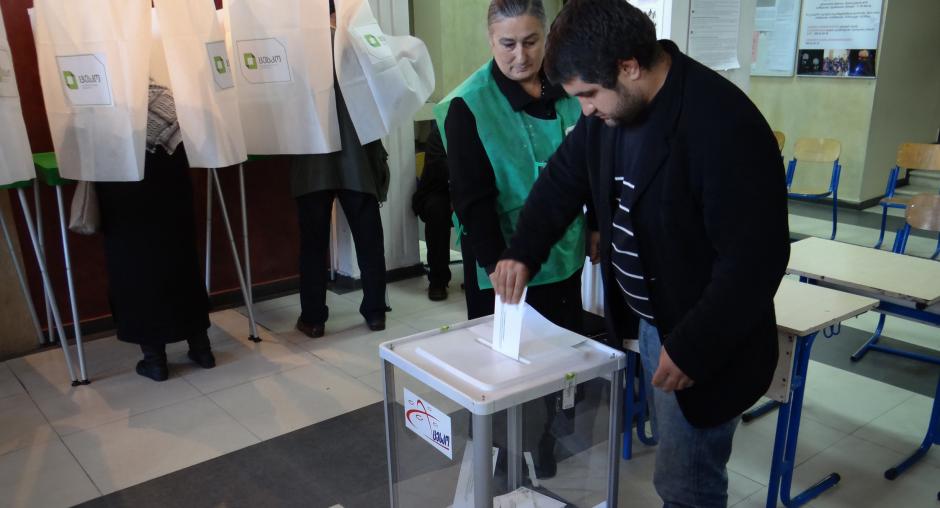Fundamental freedoms respected in well-administered presidential election in Georgia, international observers say

TBILISI, 28 October 2013 – The 27 October presidential election in Georgia was efficiently administered, transparent and took place in an amicable and constructive environment, the international observers concluded in a preliminary statement released today. Fundamental freedoms of expression, movement and assembly were respected, and candidates were able to campaign without restriction.
“In a positive and transparent election, the Georgian people have confirmed last year’s historic transfer of power,” said João Soares, the Special Co-ordinator who led the short-term OSCE observer mission. “This clean election following a political cohabitation tells me that Georgia’s democracy is maturing.”
Twenty-three candidates were registered by the Central Election Commission (CEC) in a transparent and inclusive manner. Although less polarized, personality politics continued to dominate the public debate throughout the campaign, the statement says.
The CEC managed the preparations for the election in a professional, transparent and timely manner, and there was a high degree of confidence in its work, the observers conclude. CEC sessions and meetings were open to observers, non-governmental organizations and the media.
“Just one year after the parliamentary elections, Georgia’s citizens have again demonstrated their political maturity in this presidential election, in a peaceful climate and with an inclusive process, thanks to the election administration. These elections are an important achievement for the country and for the entire South Caucasus region. Apart from this, we feel that it is a pity that two Russian members of our delegation were not able to participate in this mission,” said Meritxell Mateu Pi, Head of the PACE delegation. “The Parliamentary Assembly remains ready to assist the Georgian authorities in consolidating the democratic process in this country.”
A wide range of views and information was made available to voters through the media, providing candidates with a platform to present their programmes and opinions freely. Even though free airtime was guaranteed only to those candidates who qualified for it, the main media outlets covered all major contestants in a balanced manner, the statement says.
“With yesterday’s vote, Georgia brings this cycle of elections to a close. The Georgian people can be proud of the democratic steps they have made,” said Ilkka Kanerva, Head of the OSCE PA delegation. “I encourage the country and all the political and civil society actors to use this important progress to continue moving forward, without dwelling on the past.”
The legal framework is comprehensive and provides a sound legal basis for the conduct of democratic elections, and the majority of previous ODIHR recommendations were addressed in amendments introduced since the last election. However, several provisions of the Election Code remain unclear and were not applied in a consistent manner.
“Yesterday’s election demonstrated the Georgian people’s commitment to the democratic process. That process was conducted professionally and transparently in an amicable and constructive environment,” said Mati Raidma, Head of the NATO PA delegation. “Essentially, what we observed yesterday was a European election.”
Civil society and citizen observer organizations undertook a number of activities to support the electoral process and monitor the elections. The involvement of a large number of citizen observers and groups throughout the electoral process enhanced transparency, the observers conclude.
“This was an important day for the country – the Vilnius Summit will take place in a month’s time, where Georgia will have the opportunity to initial an association agreement with the European Union, as an important step on the path to European integration” said Krzysztof Lisek, Head of the EP delegation. “The actual signing of the agreement, however, should be conditioned on tangible progress in the area of rule of law and democracy.”
“Over the past six weeks, we have observed a competitive, transparent and well-administered election, in which both the authorities and the opposition played positive roles,” said Matteo Mecacci, Head of the OSCE/ODIHR long-term election observation mission. “This type of process, where all those involved, including a viable opposition, play their proper roles is essential for the consolidation of democratic institutions.”
For further information contact:
Thomas Rymer, OSCE/ODIHR, +995 577 664 494 or +48 609 522 266, [email protected]
Roberto Montella, OSCE PA, +995 577 664 601 or +43 699 104 286 81, [email protected]
Nathalie Bargellini, PACE, +33 388 41 22 82, [email protected]
Marta Udina, EP, +995 558 139 564 or +32 473 844 389, [email protected]
Svitlana Svyetova, NATO PA, +995 577 664 605 or +32 477 639 477, [email protected]
